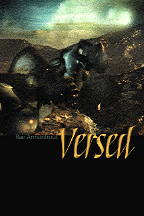Each day leading up to the March 11 announcement of the 2009 NBCC award winners, Critical Mass highlights one of the thirty finalists. Today, NBCC board member James Marcus discusses poetry finalist Rae Armantrout's Versed (Wesleyan University Press)
poetry finalist Rae Armantrout's Versed (Wesleyan University Press)
For much of her lengthy career, Rae Armantrout has cocked a skeptical eye at the American language—as if it needed a background check and a good body frisk. It wasn’t the music of words that aroused her suspicions. It was their capacity to sneak in bad faith and political flab under the radar. And yet Armantrout’s poems, with their tendency, as she has said, to “focus on the interventions of capitalism into consciousness,” have nothing of the ideological hall monitor about them. They are instead playful, poignant, and metaphysically alert—never more so than in Versed, her tenth collection.
Here as elsewhere, she has a fondness for the snub-nosed, snapped-off line bequeathed to American poetry by William Carlos Williams. Her attitude to the sort of humble objects that prompted Williams’s famous credo (“No ideas but in things”) is a little more complicated. She begins “Name Calling” with a tongue-in-cheek denunciation: “Objects are silly. / Lonesome / as the word ‘Ow!’ / is.” And yet in the next stanza, she seems more than willing to pay them mind:
Could we grant them
a quorum—
dense,
with the shiny
glossolalia
of the leaves,
the resilience
of open-ended
questions?
She is similarly ambivalent about the very idea of metaphor. On one hand, it strikes her as an endless series of bogus equivalencies. In “Equals,” such representations seem downright sinister: “One lizard / jammed headfirst / down the throat / of a second.” In “Integer,” Armantrout is even more straightforward: “Metaphor / is ritual sacrifice. / It kills the look-alike.” Yet her own poems are constructed out of marvelous (if strictly rationed) bits of figurative language, and she knows we are more or less stuck with the “mesh / of near / approximations.” In “Scumble,” a witty riff on the arbitrary relationship of words to the things they represent, she asks:
What if there were a hidden pleasure
in calling one thing
by another’s name?
Oh, but there is. Doubters need only immerse themselves in Versed, whose vigilant, often beautiful poems seem to reset the reader’s mental instrumentation—what Armantrout calls the “whirligig / of attention, / the figuring and / reconfiguring / of charges / among orbits / (obits) / that has taken forever.”
Click here to see Rae Armantrout read from Versed.
The NBCC awards ceremony is free and open to the public, as are the readings by NBCC finalists on Wednesday, March 10. To purchase tickets to the reception following the awards ceremony, click here.


